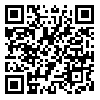Volume 15, Issue 3 (Autumn 2008)
Journal of Translational Medical Research. 2008, 15(3): 32-39 |
Back to browse issues page
Download citation:
BibTeX | RIS | EndNote | Medlars | ProCite | Reference Manager | RefWorks
Send citation to:



BibTeX | RIS | EndNote | Medlars | ProCite | Reference Manager | RefWorks
Send citation to:
Moodi M, Sharifzadeh G. The effect of instruction on knowledge and attitude of couples attending pre-marriage consultation classes. Journals of Birjand University of Medical Sciences 2008; 15 (3) :32-39
URL: http://journal.bums.ac.ir/article-1-340-en.html
URL: http://journal.bums.ac.ir/article-1-340-en.html
1- MSc. in Health Education, Instructor, Faculty of Public Health, Birjand University of Medical Sciences. Birjand, Iran , mitra_m2561@yahoo.com
Abstract: (23702 Views)
Background and Aim: Marriage and establishing a family is one of the most important events of everyone's life which has significant effects on personal and social health if it occurs appropriately and is intertwined with enough knowledge. To reach these positive effects, pre-marriage consultation is taken into consideration and it is accurately planned. Under such an instructional program, couples are familiarized with fertility health problems and this promotes their health level significantly. This study aimed at determining the effect of pre-marriage consultation classes. Materials and Methods: This pre-post quasi-experimental study was done on 250 couples attending pre-marriage instruction classes. Means for data collection was an autonomous questionnaire which had been designed according to the aims of the study and its reliability and validity had been confirmed. The questionnaire consisted of three sections namely demographic questions, knowledge questions (27 cases), and attitude questions (18 cases). The questionnaire was filled out in two stages i.e. before and after pre-marriage consultation program which was presented in lectures. Then, the effect of such an instruction was analyzed by means of statistical paired T-test, one-way variance analysis, and Chi-square. Results: Mean age of the couples under study was 22.4±4 years. According to the results of the study, 83.2% of the couples had weak knowledge, 16% average knowledge, and 0.8% had good knowledge before intervention. After instructional intervention the knowledge of 60.4% was weak, 31.6% had average knowledge and 8% benefited good knowledge thus, the difference was statistically significant (P<0.001). Moreover, mean knowledge was 8.7±4.8 before intervention but it reached 12.4±5 after intervention (P<0.001). Mean attitude increased from 42.6±4.9 (before intervention) to 47.5±4.3 after invention (P<0.001). The study also showed that the difference in mean knowledge and attitude before and after intervention regarding fertility, family planning, genetic diseases, and disabilities was statistically significant (P<0.001). Conclusion: Although mean knowledge and attitude of the couples under study increased after instruction the increase was not so high in knowledge (only 4.3%) and after intervention only 8% of the couples gained acceptable knowledge. Thus, in order to develop a relatively stable behavior in young couples it is recommended that the quality of the instructional classes would be overemphasized.
Type of Study: Original Article |
Subject:
Health Education
Received: 2009/02/17 | Accepted: 2016/03/10 | ePublished: 2016/03/10
Received: 2009/02/17 | Accepted: 2016/03/10 | ePublished: 2016/03/10
Send email to the article author
| Rights and permissions | |
 |
This work is licensed under a Creative Commons Attribution-NonCommercial 4.0 International License. |





